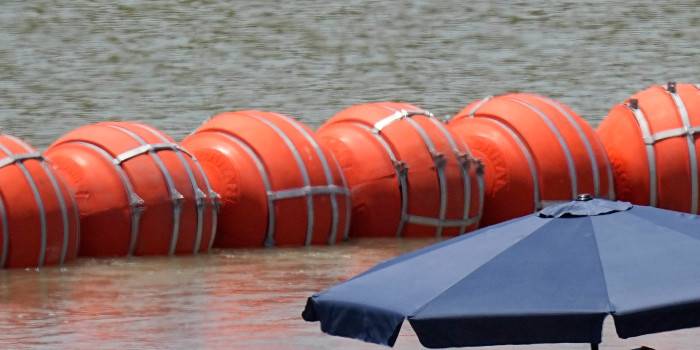(, The Center Square) – Texas installed a new marine barrier of buoys last month in the Rio Grande River in Eagle Pass as part of its border security mission, Operation Lone Star.
Not soon after, a local business sued and most news coverage was about the buoys. But according to the lawsuit and the attorney who filed it, the purpose of the lawsuit isn’t solely about the buoys but about ending Operation Lone Star altogether. According to the brief, “Plaintiffs seek to permanently enjoin the Defendants from utilizing and/or enforcing OLS in the State of Texas and permanently enjoin Defendants from installing buoys in the Rio Grande River.”
At the heart of the lawsuit is whether Gov. Greg Abbott can use the Disaster Act of 1975 as the basis to enact border security measures.
As part of an ongoing effort to secure the border and prevent illegal immigration ports of entry on state land, Abbott announced a marine barrier was being installed to secure the border “at the border.”
Laredo-based attorney Carlos Evaristo Flores sued on behalf of Eagle Pass business owner Jessie Fuentes, owner of Epi’s Canoe and Kayak Team. His company offers canoe and kayaking tours on the Rio Grande River and other Texas rivers, and he argues the buoys will hurt his business. The lawsuit didn’t stop the buoys from being installed.
The Department of Justice then sued, alleging Texas was violating an international treaty by installing them.
In response to the buoy lawsuit, Abbott tweeted, “We will see you in court. And don’t think the Travis Co. Court will be the end of it. This is going to the Supreme Court. Texas has a constitutional right to secure our border.”
His response to the DOJ lawsuit was similar, arguing Texas has a right to defend its border.
While Abbott has yet to formally declare an invasion, he issued an executive order last July invoking clauses of the Texas and U.S. constitutions first cited by the judges of Kinney, Goliad and Terrell counties, the first in Texas history to declare an invasion. One year previous, they and other judges issued disaster declarations, citing the border crisis.
But the statutes Abbott cites aren’t the legal basis he’s using to fund Operation Lone Star, Flores told The Center Square, the 1975 Disaster Act is. He’s suing, he says, because “Governor Abbott misapplied the Disaster Act to implement OLS.”
Abbott issued a disaster declaration on May 31, 2021, in response to the county disaster declarations. Since then, all of the border disaster declarations are renewed every 30 days.
The Disaster Act, in part, defines disaster as an “imminent threat of widespread or severe damage, injury, or loss of life or property resulting from any natural or manmade cause, … other public calamity requiring emergency action… .” Flores argues the statute “cannot be used to regulate the Texas-Mexico border because none of its definitions address immigrants, the border or crimes committed by immigrants.”
He also argues the Disaster Act doesn’t authorize Texas to “secure the border, to prevent, detect, and interdict transnational criminal behavior between ports of entry,” to apprehend hundreds of thousands of illegal foreign nationals or bus anyone to sanctuary cities. It also doesn’t allow Abbott to create “a border czar, like a king or duke, to govern the OLS Zone,” or obtain land to construct border barriers, he says.
State agencies involved in OLS are also acting outside of the Texas Administrative Procedures Act, he argues, because the act doesn’t allow Texas to create its own border patrol or border wall policy.
He told The Center Square the lawsuit is a “straight textual challenge to the statute. We are not against law enforcement or the important role they play in keeping communities safe. We respect their job and we want them to do it well. This case is about the governor’s authority.”
The lawsuit also states that those illegally entering the U.S. “do not constitute ‘the occurrence or imminent threat of widespread or severe damage, injury, or loss of life or property resulting from any natural or man-made cause’ that triggers the emergency powers contained in the Disaster Act as stated in Gov. Abbott’s proclamations.”
Kinney County Attorney Brent Smith, who was the first to draft a disaster declaration citing the border crisis, told The Center Square the lawsuit is “absurd.”
“The basis of Mr. Fuentes’s argument is grounded in his absurd opinion that the border crisis does not pose an imminent threat that has led to damage, injury, or loss of life or property,” he said. “I would urge him to visit the families of over 100,000 people who have lost their loved one to fentanyl poisoning and tell them their loss should not be considered a disaster. Perhaps he should explain to the thousands of property owners along the border that their livelihood is not important enough to be considered a loss of property. The facts on the ground cannot define this crisis as anything but a disaster.”
Smith, who led the charge for Texas to declare an invasion and repel it, argues, “The state of Texas, as a sovereign political entity, has the inherent authority to enforce its own borders and protect its citizens,” citing the U.S. Constitution; states have “the sovereign authority to act in the protection of their citizens when threatened by ‘invasion or imminent harm.’”

